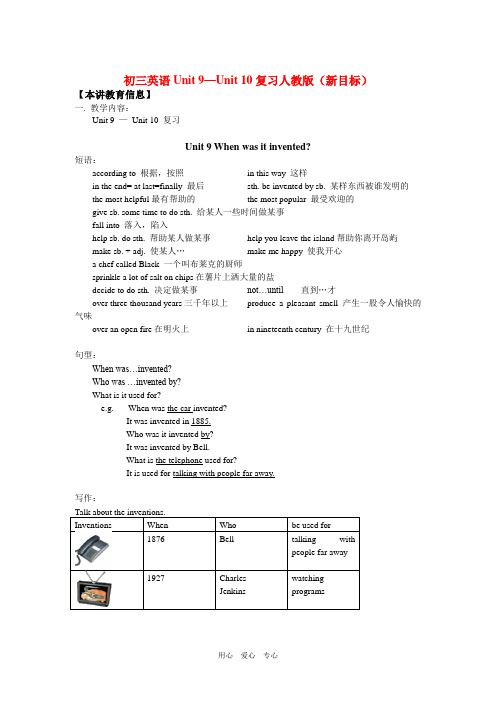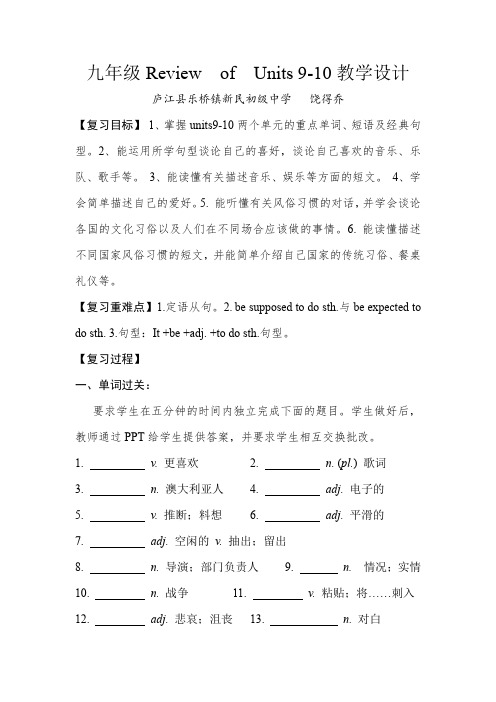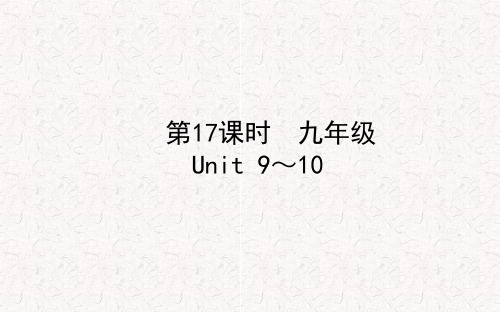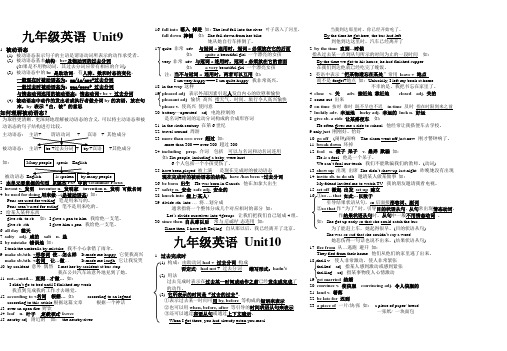九年级英语Unit9-10复习提纲
- 格式:doc
- 大小:40.00 KB
- 文档页数:3

初三英语Unit 9—Unit 10复习人教版(新目标)【本讲教育信息】一. 教学内容:Unit 9 —Unit 10 复习Unit 9 When was it invented?短语:according to 根据,按照in this way 这样in the end= at last=finally 最后sth. be invented by sb. 某样东西被谁发明的the most helpful最有帮助的the most popular 最受欢迎的give sb. some time to do sth. 给某人一些时间做某事fall into 落入,陷入help sb. do sth. 帮助某人做某事help you leave the island帮助你离开岛屿make sb. + adj. 使某人…make me happy 使我开心a chef called Black 一个叫布莱克的厨师sprinkle a lot of salt on chips在薯片上洒大量的盐decide to do sth. 决定做某事not…until直到…才over three thousand years三千年以上produce a pleasant smell 产生一股令人愉快的气味over an open fire在明火上in nineteenth century 在十九世纪句型:When was…invented?Who was …invented by?What is it used for?e.g. --When was the car invented?-- It was invented in 1885.-- Who was it invented by?-- It was invented by Bell.-- What is the telephone used for?-- It is used for talking with people far away.写作:InventionsFill in the blanks and then choose one to make a report.The__________ was invented in ________. It was invented by _________. It is used for ________________.语法:被动语态一. 被动语态的时态及结构(以动词do为例)1. 结构:主语+ be + 过去分词(过去分词不变,所有人称,数,时态的变化,都体现在助动词be的变化上。

九年级Review of Units 9-10教学设计庐江县乐桥镇新民初级中学饶得乔【复习目标】1、掌握units9-10两个单元的重点单词、短语及经典句型。
2、能运用所学句型谈论自己的喜好,谈论自己喜欢的音乐、乐队、歌手等。
3、能读懂有关描述音乐、娱乐等方面的短文。
4、学会简单描述自己的爱好。
5. 能听懂有关风俗习惯的对话,并学会谈论各国的文化习俗以及人们在不同场合应该做的事情。
6. 能读懂描述不同国家风俗习惯的短文,并能简单介绍自己国家的传统习俗、餐桌礼仪等。
【复习重难点】1.定语从句。
2.be supposed to do sth.与be expected to do sth. 3.句型:It +be +adj. +to do sth.句型。
【复习过程】一、单词过关:要求学生在五分钟的时间内独立完成下面的题目。
学生做好后,教师通过PPT给学生提供答案,并要求学生相互交换批改。
1. v. 更喜欢2. n. (pl.) 歌词3. n. 澳大利亚人4. adj. 电子的5. v.推断;料想6. adj.平滑的7. adj. 空闲的v.抽出;留出8. n. 导演;部门负责人9. n. 情况;实情10. n. 战争11. v.粘贴;将……刺入12. adj.悲哀;沮丧13. n.对白14. n.戏;剧15. v.关闭;关上16. v.反映;映出17. v. 同情n. 遗憾18. n.主人v.掌握19. v. 回忆起;回想起20. n.伤口;创伤v.使受伤21. n.风俗22. v. 鞠躬23. n. &v. 吻24. n.首都25. n. 护照26. n. 粉笔27. n. 黑板28. adj. 北方的29. n.海岸30. v. 敲n.敲击声31. adj. 东方的32. adj. 有……价值(的)33. n. 方式;方法(pl.)礼貌;礼仪34. adj.空的35. adj.基本的;基础的36. n.&v. 交换37. n. (外)孙女38. v.表现;举止39. prep. 除……之外conj. 除了;只是40. n. 肘41. adv. 逐步地;渐进地二、短语归纳:要求学生在五分钟的时间内独立完成下面的题目。


九年级英语Unit91. 被动语态(1). 被动语态表示句子的主语是谓语动词所表示的动作承受者。
(2). 被动语态基本结构:be+及物动词的过去分词(如果是不用物动词,其过去分词应带有相应的介词) (3). 被动语态中的be 是助动词,有人称、数和时态的变化。
一般现在时被动语态为:am/is/are+过去分词一般过去时被动语态为:was/were+ 过去分词与情态动词连用的被动语态:情态动词+ be + 过去分词(4). 被动语态中动作的发出者或执行者做介词by的宾语,放在句末,by 表示“由,被”的意思如何理解被动语态?为取胜更清晰、更深刻地理解被动语态的含义,可以将主动语态和被动语态的句子结构进行比较。
主动语态:其他成分被动语态:+其他成分如:2. 本单元要掌握的句型见课本P69 中的Grammar Focus3. invent v. 发明inventor n. 发明家invention n. 发明可数名词4. be used for doing用来做…(是被动语态) 如:Pens are used for writing. 笔是用来写的。
Pens aren’t used for eating. 笔不是用来吃的。
5. 给某人某样东西give sth. to sb. 如:I gave a pen to him. 我给他一支笔。
give sb. sth. I gave him a pen. 我给他一支笔。
6. all day 整天7. salty adj. 咸的salt n. 盐8. by mistake 错误地如:I took the umbrella by mistake. 我不小心拿错了雨伞。
9. make sb./sth. +形容词使…怎么样It made me happy. 它使我高兴make sb./sth. +名词让…做…It made me laugh. 它让我发笑10. by accident 意外偶然I met her by accident at bus stop.我在公共汽车站意外地见到了她。

九年级(全)Units9-10安徽中考真题精选Ⅰ.单项填空(2013·安徽第49题)I still remember the college and the teachers I visited in London years ago.(C)A.whatB.whoC.thatD.whichⅡ.单词拼写1.(2016·安徽第94题)The little girl kisses (亲吻) her mom good night before she goes to bed.2.(2015·安徽第93题)The newly⁃opened museum is certainly worth (值得) a visit.3.(2013·安徽第100题)It’s polite to knock (敲) on the door before entering a room.熟词生义1.spare熟义:adj.空闲的;不用的v.抽出;留出生义:v.不吝惜(时间、金钱)(1)A good hobby adds a lot of fun to our spare life. 空闲的 (2)Don’t forget to spare some time together with your family. 抽出 (3)He spared no effort to make her happy again. 不吝惜 2.down熟义:adv.(坐、躺、倒)下prep.向下;沿着adj.悲哀;沮丧生义:adv.下降;下跌;减少;减弱(1)—Mom and Dad,I will work harder and I won’t let you down.—Never give up!We are always there to help you. 失望 (2)You fell down,and then got back up.(2019·安徽) 倒下 (3)As I was going down the street,it suddenly rained heavily.(2018·安徽) 沿着 (4)House prices have come down in recent months. 下降 3.sense熟义:v.感觉到;意识到n.感觉;意识生义:n.道理;意义;合理性(1)She doesn’t talk much,but what she says makes sense. 道理 (2)She sensed that she was being watched. 感觉到 4.value熟义:v.重视;珍视n.价值生义:v.评估;估价(1)Please value your life,and stay away from drugs!(2020·贵州遵义) 珍惜 (2)Many teens do not value the importance of working hard.(2020·湖南娄底) 重视 (3)The meaning of life doesn’t depend on how much you are worth,but depends on how much value you can create! 价值 (4)This house has been valued at over three million yuan. 估价 5.effort熟义:n.努力;尽力生义:n.力气;精力(1)These are all rewarding experiences because of the time you spent and the effort you made.(2020·辽宁抚顺) 努力 (2)Writing the book takes Mary a lot of time and effort. 精力 6.empty熟义:adj.空的;空洞的生义:v.倒空;清空(1)It’s your turn to empty the garbage. 倒空 (2)At midnight,the street was empty. 空的 名师考点精讲考点1 prefer的用法【教材原句】I prefer music that has great lyrics.我更喜欢歌词优美的音乐。

新人教版9上英语unit9-unitl0单元复习-.重点短语22. take off 脱下(衣服);(飞机等)起飞23. make an effort 作出努力24. make sb feel at home 使某人感到宾至如归 25. cut up 切开;切碎 26. be expected to do 被期待做…27. make friends with 与…交朋友28. as soon as ----- 就…29. be diffcrcnt from 与…不同30. on time 按时 in time 及时二. UnitlO 重点句子:1・在你们国家,当你第一次见到别人的时候,你应该怎么做?In your country, what are you supposed to do when you meet someone for the first time? 2・在美国,他们应该握手。
In the United States, they' re expected to shake hands.I. song along wi th 随之歌唱 3.. in that case 既然那样 5. stick to 坚持;固守 7. plenty of 大量;充足 9. cheer up 高兴起来;振作起来 II. . get married 结婚 13.be supposed2. be sure 确定;确信 4. in case 万一 6. in total 总共;合计 8. once in a while 偶尔;间或 10. shut off 关闭12. by the end of 在…的末尾to do sth 被期望/要求做某事;应该14. shake hands 握手 访 16.after all 毕竟;终归 起接某人18. point at 惯于20.get mad 大动肝火;气愤15.drop by 顺便拜17.pick up 拾起;捡19.get used to 习21. clean …off 把…擦掉3・我交了一些新朋友。
Unit9一.重点短语dance to 随......跳舞too much 太多in that case 那样的话stick to 坚持,固守depend on 依靠,依照cheer up 使......振奋起来shut off 关闭,停止运行once in a while 偶尔地,间或be known for 以......而著名look up(在字典,参考书或电脑上)查阅,抬头看in total 总共,合计二.单元语法总结1.定语从句:在复合句中,修饰某一名词或代词的句子(从句)叫定语从句。
先行词:定语从句所修饰的词。
定语从句作定语放在先行词的后面。
2.引导定语从句的词有关系代词和关系副词关系代词:that,which,who(宾格whom,所有格whose)关系副词:when,where,why.关系代词和关系副词放在先行词和定语从句之间,既起联系作用,同时又作定语从句的一个成分。
关系代词的基本用法如下:作主语作宾语作定语指物that/which that/whichwhose指人who/that that/whom/who注意:which与that指物时可互相代替,但that比which更常见,尤其在口语中。
但要注意that可用来指人,而which则不能指人。
只能用that引导定语从句的情况:1.定语从句所修饰的词,同时又被形容词最高级修饰时Eg:This is the most interesting story (that) I have ever heard.2.定语从句所修饰的词,同时又被序数词修饰时Eg:The children like the second lesson that is about “The football match”.3.定语从句修饰的词同时被the only,the very或the same修饰时Eg:It’s the only word that I know in the message.4.定语从句修饰词为everything,something,anything,all,none,much,little,few等不定代词时Eg: Here is something that I will tell you .5.定语从句修饰的词同时又被不定代词all,any,no,every,little,或much,many等修饰时Eg:Here is all the money that I have.6.定语从句修饰的词中同时含有人和物时Eg:I can remember well the persons and some pictures that I see in the room.7.定语从句所修饰的词为one时Eg: Is it the one that you want?8.为了避免重复,在疑问词Who之后,用that引导Eg:Who is the girl that won the first place?3.who指人,that除指物外有时指人,在从句中作主语或宾语。
九年级(全)Unit9—Unit10一、重点单词1.adj.酸的 2. adj.古代的,古老的 3. v.被遗留4. v.注意到5. n.世纪,百年6. v.敲,击,碰撞7. n.篮,筐8. n.金属9. prep.&adv.在…..下面,低于10. v.加热,使变热11. v.发明,创造12. adj.活动的,活泼的13. v.划分,分开14. v.上升15. v.冲,奔16. v.锁,锁上17. adj&v.空的,排空,倒出18. adj.极其疲惫的,筋疲力竭的19. v.嫁,娶,与……结婚二、词汇拓展1invent(v.)→(n.)发明家→(n.)发明2.embarrass(v.)→ (adj.)尴尬的→ (adj.)令人尴尬的3.operate(v.)→ (n..)手术4.salt(n.)→ (adj.)咸的,含盐的5.produce(v.)→(n.)产品6.please(v.)→ (adj.)满意的,令人愉快的7.mix(v.)→(n.)混合,混合物8.create(v.)→(adj.)有创造力的9.wood(n.)→ (adj.)木制的10.develop(v.)→ (n.)发展11.popular(adj.)→(n.)普及,流行12.farm(n.)→(n.)农夫13.throw(v.)→ (过去式)投,掷→ (过去分词)投,掷14.annouce(v.)→ (n.)布告,公告 15.convince(v.)→(adj.)令人信服的三、重点短语1. 根据,按照2. 跑掉,离开3. 露面4. 停止运转5. 愚人节6. 激起,引起7. 卖完,售光8. 一片,一块9. 习惯做10. 错误地11. 偶然地12. 落入,陷入13. 这样14. 与…相撞15. 到…时候16. 发出响声17. 准时,按时18. 结婚四、重点句子1.我认为电话在小汽车之前发明。
我认为电脑在计算器之后发明。
Unit 9 I like music that I can dance to.复习提纲重点单词:prefer更喜欢smooth悦耳的,平滑的war战争down悲哀的dialog对话sense感觉到sad悲伤的sadness悲伤n. pain痛苦n. painful痛苦的adj. moving令人感动的moved被感动pity遗憾master大师praise表扬wound伤口重点短语:spare time空闲时间in that case既然那样stick to坚持depend on依赖于cheer sb. up使某人高兴plenty of大量shut off停止运转once in a while偶尔的too… to 太…而不能not… anymore再也不one of the +最高级+n.复数最…之一teach sb. to do教某人做某事get married结婚by the end of 在…结束之前in total总共重点句子:What kind of music do you like? 你喜欢什么类型的音乐?I like music that I can dance to / sing along with.. 我喜欢我能跟着跳舞/ 唱的音乐。
I prefer music that has great lyrics. 我喜欢歌词很棒的音乐。
Carmen likes musicians who play different kinds of music. 卡门喜欢演奏不同种类音乐的音乐家。
I prefer movies that give me something to think about. 我喜欢能给我思考的电影。
Laughing for two hours is a good way to relax. 两个小时的欢笑是一种放松的好方式。
语法:定语从句:先行词+关系词+从句,先行词是人,用that; who(后跟动词,作从句主语); whom(作从句宾语); whose(作物主), 先行词是物,用that; which(作主语或宾语); whose(作物主)。
关系词前有介词,关系词只能用which。
当先行词是不定代词时,有only, very, the same, the last, all, any, some, no, little修饰时,有序数词或者形容词最高级修饰时,有人又有物时,关系词只能用that.写作范文:Jay Zhou is my favorite singer. He was born in a small town in Taiwan in 1979. When he was a child, he didn’t like to talk too much. And he did badly in many school subjects. But he loves music. He learned to play the guitar, piano and so on. He was talented in music. When his first record came out in 2000, he soon became famous all over China. Although he didn’t sing clearly, he is still loved by many people. I love his songs “Qinghuaci” best because it has great lyrics. I am a fan of him because I like musicians who write their own music.Exercise:单项选择:( )1. This is the novel ___ is written by Guo Jingming. A. that B. who C. what D. /( )2. I’ll never forget the day ___ the teacher came to see me in the hospital.A. thatB. whyC. whenD. where( )3. Sorry, we don’t have the coat ___ you need. A. what B. who C. which D. whom( )4. The two students ___ you taught three years ago have become drivers. A. when B. whom C. where D. whose ( )5. The first thing ___ my sister is going to do this evening is to write a letter.A. whichB. whoC. thatD. why( )6. This is the man ___ photo I took yesterday. A. who B. whose C. whom D. that( )7. The doctor ___ is talking with you is a friend of mine.A. whoB. whenC. whichD. whom( )8. Watch the old woman and her dog ___ are crossing the street.A. whichB. thatC. whoD. whom( )9. Doing exercise _____ good for your health.A. beB. amC. isD. are( )10. There is _____ milk in the fridge.A. a plenty ofB. plenty ofC. the plenty of D> plenties of( )11. Mr. Liu is one of _____ teachers in our school.A. popularB. more popularC. the most popularD. the more popular( )12. _____ that case, you should turn to your teachers or parents for help.A. ToB. InC. ForD. With二、用适当形式填空1. Jack is too young __________(go) to school.2. Could you tell me the best way ____________(learn) English.3. ____________(listen) to music after a long work helps us relax.4. We should try our best ____________(get) good grades in school.5. After he got ____________(marry), he continued to play erhu on the streets.6. The music was ______________(strange) beautiful.7. The music is one of the most _____________(move)pieces that I have heard.Unit 10 You’re supposed to shake hands. 复习提纲重点单词:kiss greet relaxed value capital noon chalk blackboardnorthern coast season manner empty behave suggestion重点短语:make friends with sb. as soon aseach other to one’s surprisea bit=a little everyday life drop by make plans to dobe on time invite sb. to get mad make an effort toavoid doing sth. keep sb. doing without +v-ing clean offtake off as…as possible stick into after allbe/get used to+v-ing used to+v原be worth + v-ing knock at重点句型:What are you supposed to do when you meet someone for the first time?You’re supposed to shake hands.I was supposed to arrive at 7:00.You’re expected to wear a suit and tie.It’s no big deal.It is helpful to learn as many of customs as possible.They go out of their way to make me feel at home.写作范文:China is a very traditional country. Here are some things you need to know when you are invited to have dinner at a friend’s home in China. First of all, you’re supposed to eat with chopsticks. Second, the oldest person is supposed to eat first. Third, it’s polite to pick up your bowl while eating. it’s impolite to put your bowl on the table when you eat. Fourth, don’t make too much noise at the table. But you can talk with others.Welcome to China and enjoy the delicious food. I think you’ll like it.Exercise用适当形式填空1. Without ______________(say) a word, he left.2. Are you supposed _____________(come) earlier?3. It’s important for students _____________(study) hard.4. Every one of us has a story worth ____________(tell).5. My brother and I grew up in ___________(north) China.6. How did you ___________(behave) at the table?7. I am used to ______________(play) basketball after school now. I used to ____________(play) soccer.单项选择( )1. It’s your turn to clean the chalk _____ the blackboard.A. offB. atC. byD. for( )2. It’s necessary for you to make plans _____ your friends in Switzerland.A. seeB. to seeC. seeingD. to seeing( )3. You can’t go to anyone’s home in some countries unless you _____.A. inviteB. are invitedC. were invitedD. have invited( )4. _____ the snow, the plane had to land at an airport in another city.A. BecauseB. Because ofC. AlthoughD. With( )5. It’s bad manners to _____ someone with your chopsticks during a meal in China.A. point atB. look upC. talk toD. pick up( )6. We often just ______ our friends’ home.A. drop inB. drop onC. drop intoD. drop by( )7.John ____ Beijing the day before yesterday.A. arrived atB. arrivedC. reached toD. arrived in( )8. She is very comfortable _____ English now.A. speakB. to speakC. speakingD. speaks( )9. We are all here ______ David. His mother was ill in hospital, so he had to look after her.A. besidesB. withC. exceptD. expect。